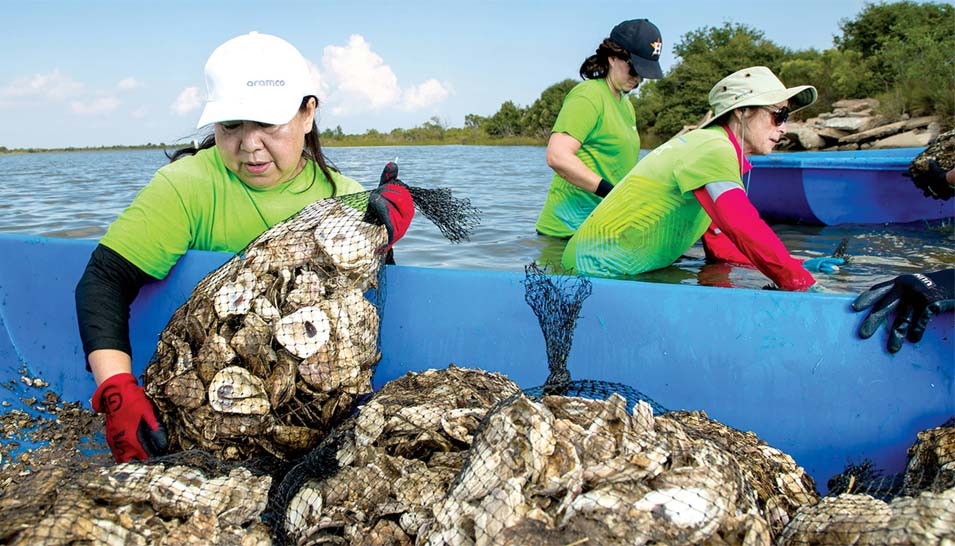
ASC volunteers bagged recycled oyster shells, then placed them in Galveston Bay to form new oyster reefs.
The Galveston Bay Foundation recently honored the volunteer efforts of Aramco Services Company (ASC) with its “Guardian of the Bay” award. This award recognizes ASC’s “leadership, work, and commitment for the betterment of Galveston Bay.”
Accepting the award on behalf of ASC were director of Public Affairs Abdulrahman A. Bayounis and Strategic Communications supervisor Alma S. Kombargi.
“ASC is proud to partner with the Galveston Bay Foundation to revitalize such a precious resource,” said Bayounis. “I would like to recognize the efforts of our ASC volunteers who come out year-after-year to give their time and effort to such a worthy cause.”
A Global Commitment to Biodiversity
The volunteer efforts are part of Aramco’s global biodiversity program to promote community and environmental involvement in projects that truly make a difference in the world. For many years, ASC volunteers have helped restore sensitive oyster reefs in the bay. The delicate reefs are vital in maintaining the bay’s ecosystem. Hurricanes Harvey and Ike caused serious damage to the reefs when the storms deposited a layer of sediment and debris atop the bottom of the bay, suffocating the live oysters.
ASC volunteers quickly responded after both of these major hurricanes to help save the oyster reefs. The wet, muddy employees, friends, and family members worked hard placing discarded oyster shells from local restaurants into bags and then positioned the bags in the bay to form a new artificial reef. Since ASC’s volunteer efforts began, more than five tons of oyster shells have been recycled to build the new reefs.
Teamwork the Key to Success
Total teamwork has been the key to these successful biodiversity efforts. “We all work as a team to accomplish these great tasks,” said one volunteer. “One bag of oysters by itself doesn’t seem like a lot, but when you add them all up, it really creates a tremendous difference for the marine life and ecosystem in the bay. That resonated with me because, as people, one person may not be able to do it all, but when we all come together and work as a team, we can make a big impact on each other, and on the world around us.”
Threatened Oyster Reefs
Oyster reefs are documented as the most threatened marine habitat worldwide, with global losses of 85%. Most of Galveston Bay’s oyster reefs have been closed to commercial operations for more than a year after Hurricane Harvey, but are now showing signs of recovery. Much of the storm’s record-setting rainfall flowed into Galveston Bay. Since freshwater is toxic to the oysters, the runoff killed much of the bay’s population. Oyster boat crews working this year’s season have been able to catch the state limit of 30 sacks of oysters. That’s about 3,000 pounds worth, destined for restaurants and tables from Texas to Florida. Protecting the bay’s oyster habitat is vital, not just for those who enjoy eating the delicacy, but for the health of the water.